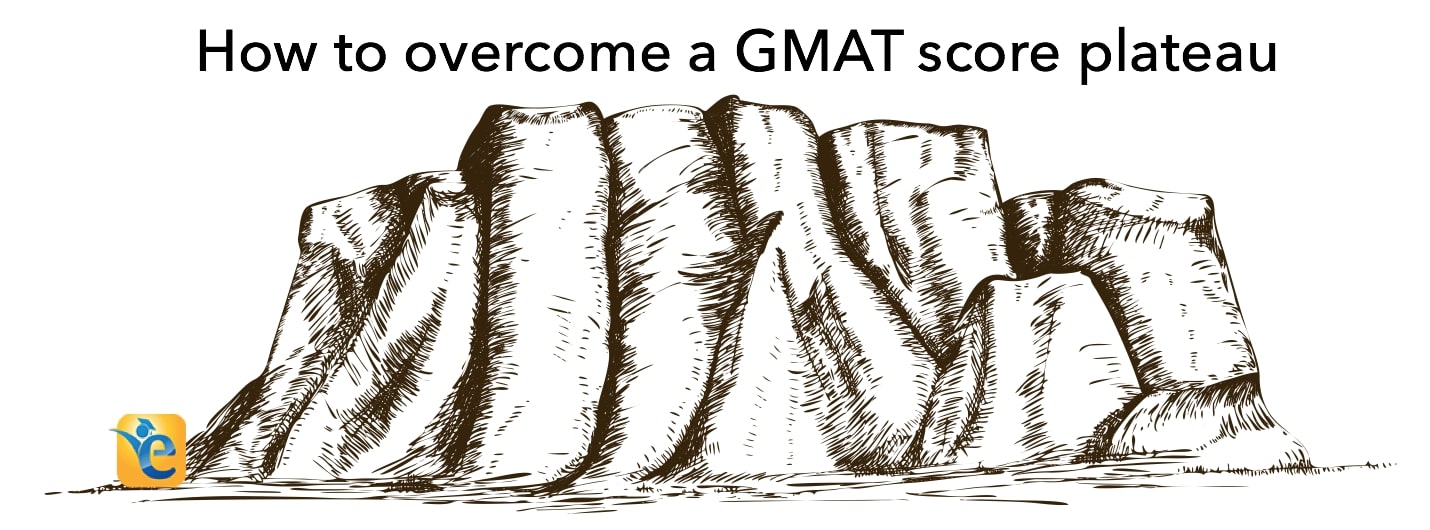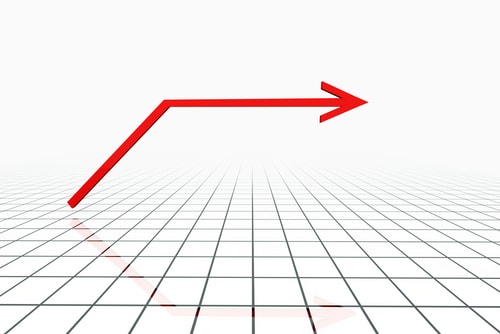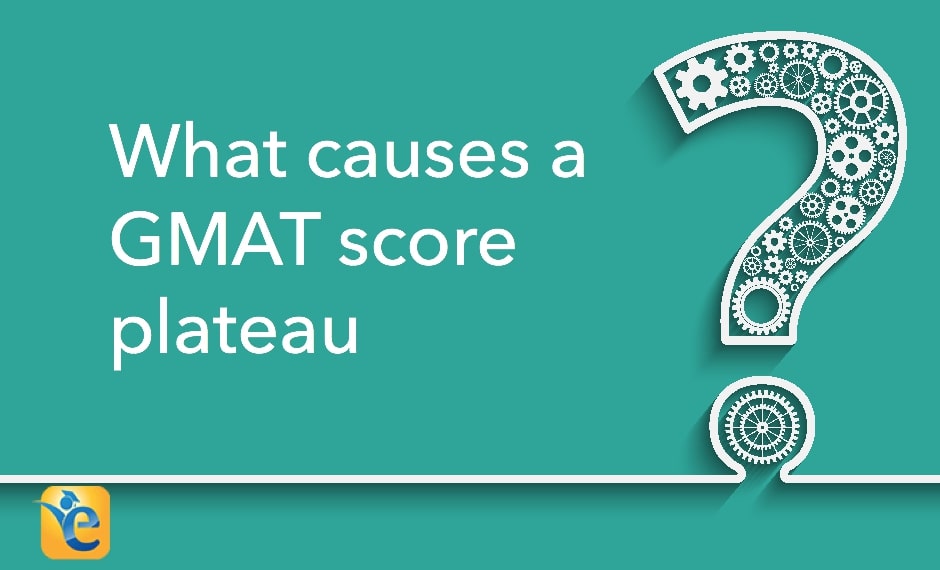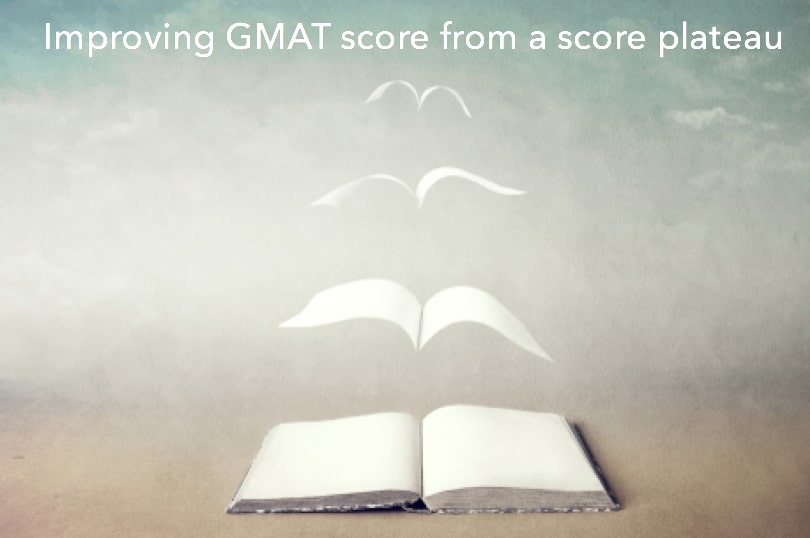“I kept scoring in low 600’s so I decided to postpone the exam for I knew that I was capable of better.”
“I am currently stuck at 630-650 score range.”
“I do feel like I have hit a score plateau in Verbal, particularly with CR (specifically with CR Assumption questions)”
“I’ve taken 3 GMAT Prep official tests and scored the same on all 3 – any pointers on how to get “unstuck?”
“I am stuck at a score plateau of 600-620 range in almost all the mocks.”
These are statements by students who are preparing for the GMAT. Do any of these statements describe your situation? A lot of students spend countless hours in preparation only to see the same score or a score in the same range flash on the computer screen. Does that mean all those hours that you spent were for nothing? In this article, we will answer this question and more –
- What is a GMAT Score Plateau?
- What causes GMAT Score Plateau?
- GMAT score improvement from a Score Plateau to reach your target score?
- Stuck at a 680 to 700 score! Learn GMAT score improvement strategies?

What is a GMAT Score Plateau?

Your scores are considered to be plateaued when you are stuck in the same score range despite having spent a considerable amount of time and effort to improve from that score. As in all the examples above most students find that improving till early 600s comes easily but improving from there on becomes difficult for them.
But score plateau is not necessarily at a 600 score. You may find that your scores plateau at much lower or higher scores too. Does that mean that you can score only that much in GMAT and it is futile to study for a higher score? The answer is an emphatic NO! Let’s understand what causes Score Plateau and then how to overcome it.
What causes a GMAT Score Plateau?
Every competitive exam has a purpose, either elimination or selection. GMAT focuses more on selection than elimination, and as a result, the test is designed to rank the students in the order of their likelihood to do well in the various Business Management programs. The test tries to assess the students on their ability to logically solve problems thrown at them.

Therefore, to ace this test, students need to have/develop the ability to think logically and more from an application perspective than just knowledge perspective. There are certain core abilities that are required to solve the questions asked in GMAT. Being adept at these skills alone can ensure a 50-percentile score on GMAT without any specific training or practice.
Students face the problem of Score Plateau because they do not think about these core skills as the foundational steps to acing GMAT. They are more focused on the last step which is to solve the question in a certain amount of time rather than ensuring that the skills required to solve the questions are developed.
At a high-level, this is seen in the score trends in Quant and Verbal. Generally, non-natives struggle in Verbal and natives struggle in Quant. This is purely because of the way they have been studying these topics so far. Natives study Verbal in a very structured manner and the core skills to comprehend English and draw inferences or identify the assumptions is developed right from the school days.
On the other hand, non-natives have a similar approach to Quant. Because of this influence right from how the topics/subjects are introduced in school, there is a significant difference in core skills and strengths of these two groups of students which is then reflected in their scores.
If you are planning to take the GMAT, we can help you with a personalized study plan and give you access to quality online content to prepare. Write to us at acethegmat@e-gmat.com. We are the most reviewed GMAT prep company on gmatclub with more than 1800 reviews (as on Feb 15, 2019). Why don’t you take a free trial and judge it for yourself?
So, what are these core skills that we have been talking about? Let’s understand this better by taking two examples.
Example 1: Let’s understand the core skills required to solve Word Problem questions by solving one question.
Q: Jacob is now 12 years younger than Michael. If 9 years from now, Michael will be twice as old as Jacob, how old will Jacob be in 4 years?
- 3 B) 7 C)15 D)21 E)25
200 students (mostly non-natives) were asked to solve this question. They were later asked to share the approach they used to solve this question, whether it was by making equations or by answer choice substitution or using some formula. Majority of them responded by saying that they solved this question by making equations despite substitution being the faster approach and the reason for that was that this was out of habit. Every time they look at a word problem they start making equations as they read the problem. Their brain is wired to think in that manner, and so they do not spend any time in thinking how to solve such questions.
The core abilities required to solve this question using the equations approach are:
- Working with Algebraic variables
- Converting statements into equations
- Relating multiple equations
- Solving equations
For someone who has plateaued at a low score (less than 35%ile ability in Quant), the problem maybe that he lacks in all these skills. Students who plateau at mid-range scores (40 to 50 %ile in Quant) usually are good at one or more of these skills but not all.
Example 2: Let’s now look at a Boldface Question in CR (Verbal)
Q: Stock prices of companies that exceed $100B in revenue, also called Extremely Large Caps (ELC), rarely beat the market over a 5 years period. It is commonly thought that this happens because these companies are too big to grow faster than the overall market. However, studies show that ELCs that provide higher returns than the market over a 5 years period, a majority of them are run by their founders. Since most of the ELCs are run by professional management that is inherently risk averse; the studies’ finding strongly suggests that the real reason why most ELCs don’t beat the market is not that they are too big to grow but rather that they are run by professional management that is too risk averse.
What role do the two boldfaced selections play in the above argument?
- The first is a claim, the accuracy of which is at issue in the argument; the second is a conclusion drawn on the basis of that claim.
- The first is an objection that has been raised against a position defended in the argument; the second is that position.
- The first is evidence that has been used to support an explanation that the argument favors; the second is that explanation.
- The first is evidence that has been used to support an explanation that the argument challenges; the second is a competing explanation that the argument favors.
- The first provides evidence to refute an explanation that the argument favors; the second is that explanation.
The core skills required to solve such questions are:
- Ability to classify a statement. For e.g., Whether a statement is a fact or an opinion
- Relating the statement to the conclusion
- Relating both the bold face statements
- Evaluating the answer choices
Like in the quant example above, your score plateau could be a result of lacking in one or more of these core skills.
GMAT score improvement from a Score Plateau – get ‘un-stuck’
As you tried to solve those questions above, I am sure you realized how each of these core skills plays an important part in reaching the correct answer for those questions. So naturally to improve your score further you need to ensure that you possess all the core skills required in various sections of GMAT. Will that be enough though? No. I am sure this answer comes as a surprise to you after reading so much about these skills and their importance.

The reason why having these skills is not enough is that most of us possess most of these skills. And like everything else in GMAT, knowing is not enough. Being able to apply the knowledge to reach the correct answer is what matters. Even in the case of core skills, knowledge of these skills is just the first step. You must develop a good proficiency in these skills to reach your target score.
Possessing these skills is the reason that you managed to reach a 600 score. But going forward requires building proficiency in these skills. It is important that you identify which of these skills is the bottleneck which is preventing you from reaching your target score. Working on the wrong skills is one of the most common reasons why students fail to improve from the score plateau.
More often than not students feel that solving more and more questions will help them improve their score. Or they feel that only going through the concepts, again and again, will improve their scores. Both of these individually is not enough. In both these cases, students miss out on the most important step of ‘REVIEW’.
After you solve any quiz or even one question, you must go through the solution in detail irrespective of whether you got the answer correct or wrong. So what is it that you are looking at in this review?
- If you are reviewing a question that you could answer correctly, you must check if you followed the process correctly and it is no fluke. In case you were confused between the last 2 options and got lucky in picking the correct solution, it is important that you see the solution and understand why the incorrect option was incorrect.
- While reviewing questions that you got wrong, make sure you make a note in your Error Log of the mistake you made and a probable reason for making it. After you have data of over 20 questions in your Error Log, you must check the error log to see where is it that you make the most number of mistakes. Once you identify that, you know which skill you must focus on.
- In quant, for example, if most of your errors are because of calculation error then you must slow down a little and review your calculation twice before rushing to mark the answer. If you do this diligently, you will automatically start spending adequate time in calculating the first time and minimize errors due to incorrect If you find that most of your errors in Word Problem questions are because your equations were not correct, then you know that you need to learn and practice how to create equations before moving forward in Word Problems.
- In verbal, for example, if you find that most of your errors are because of not being able to classify a given statement in CR or understand the intended meaning of the author in SC and RC, then you know that you need to work on these skills before anything else to see improvement in your scores.
GMAT score improvement from high Score Plateaus
If you find yourself stuck at a 680-700 score but your target score is 720+, then this section is for you. The fact that you have reached a 680+ score indicates that you do not have issues at the fundamental level. Your problem areas are at topic levels where the application of a specific concept is not as good as is required for 700+ level questions. We recommend that you follow the below mentioned 3-step process to overcome it and reach your target score:
Step 1: Take Ability Quizzes in Scholaranium (Verbal Ability Quiz | Quant Ability Quiz)
Step 2: Go to Skill Data Section of Scholaranium and identify topics in which you have the least scores and work on those topics using the course files
Step 3: Take another Ability Quiz to track improvement and repeat the steps mentioned above until you reach your target Ability scores. To determine your target Ability scores required in each section and sub-section, you may use the GMAT Planner tool
P.S. Even if you are not an e-GMAT student, you can take a few Ability Quizzes by signing up for the Free Trial














